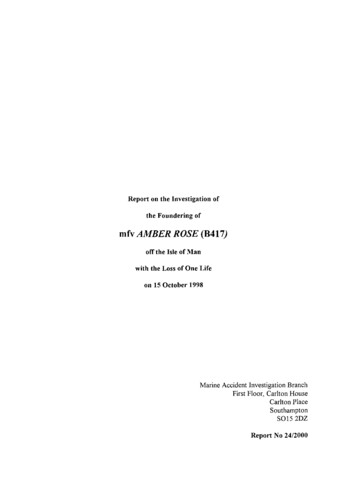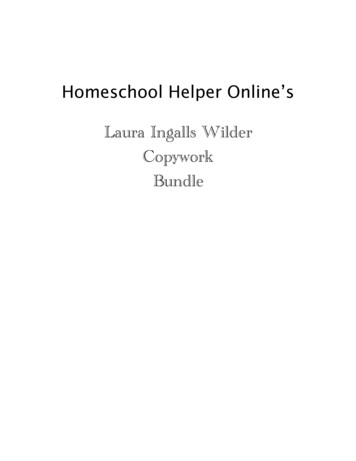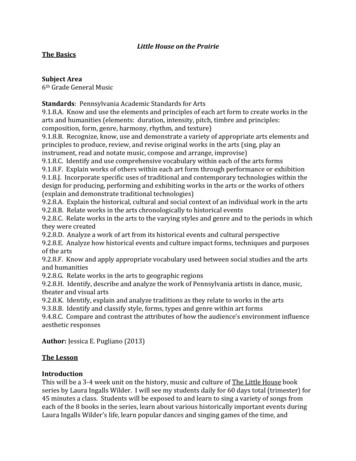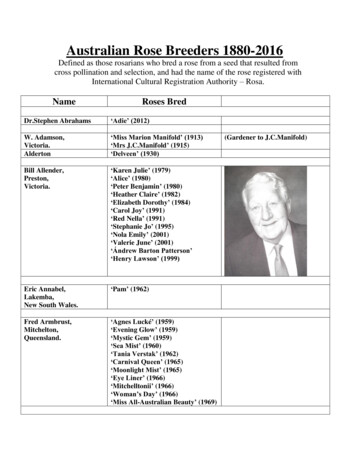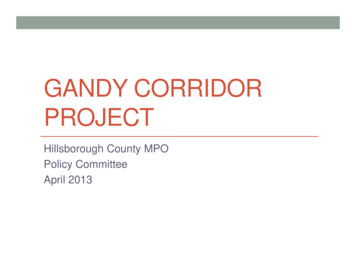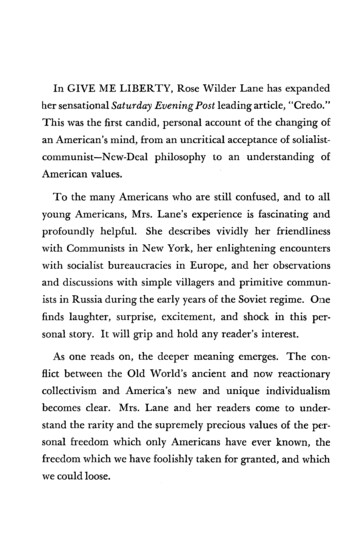
Transcription
In GIVE ME LIBERTY, Rose Wilder Lane has expandedher sensational Saturday Evening Post leading article, "Credo."This was the first candid, personal account of the changing ofan American's mind, from an uncritical acceptance of solialistcommunist—New-Deal philosophy to an understanding ofAmerican values.T o the many Americans who are still confused, and to allyoung Americans, Mrs. Lane's experience is fascinating andprofoundly helpful. She describes vividly her friendlinesswith Communists in New York, her enlightening encounterswith socialist bureaucracies in Europe, and her observationsand discussions with simple villagers and primitive communists in Russia during the early years of the Soviet regime. Onefinds laughter, surprise, excitement, and shock in this personal story. It will grip and hold any reader's interest.As one reads on, the deeper meaning emerges. The conflict between the Old World's ancient and now reactionarycollectivism and America's new and unique individualismbecomes clear. Mrs. Lane and her readers come to understand the rarity and the supremely precious values of the personal freedom which only Americans have ever known, thefreedom which we have foolishly taken for granted, and whichwe could loose.
GIVE ME LIBERTYByROSE WILDER LANEA REVISED AND ENLARGED EDITIONOF THE BOOK PUBLISHED IN 1936T H E CAXTON PRINTERS, LTD.CALDWELL, IDAHO1954
COPYRIGHT 1936, 1954 BYROSE WILDER LANEPrinted and bound in the United States of America byThe CAXTON PRINTERS, Ltd.Caldwell, Idaho77808
GIVE ME L I B E R T YI was a communist. My Bolshevik friends of thoseIsomeNdays1919are scattered now; some are bourgeois, some are dead,are in China and Russia, and I did not know the lastAmerican chiefs of the Third International, who now officiallyembrace Democracy. They would repudiate me even as arenegade comrade, for I was never a member of The Party.But it was merely an accident that I was not.In those days immediately after the first world war it wasnot prudent to advocate fundamental changes in America.The cry was, "If you don't like this country, go back whereyou came from!" I had friends, patriotic Americans fromAmerican families as old as my own, who had been tried andsentenced to twenty years' imprisonment for editing a magazine friendly to the Russian experiment. Ships lay withsteam up and papers cleared, ready to whisk from theseshores, without legal process or any opportunity for defense,groups of suspected radicals rounded up by agents of theDepartment of Justice. Policemen were breaking down unlocked doors, smashing innocent furniture and, with surprising lack of discrimination, beating up Russians who hadfled from communism because they didn't like it.Amid all this hysteria and in quite real danger, Jack Reedwas organizing the Communist Party in America.I forget the precise locale of that historic scene, but I wasthere. Somewhere in the slums of New York, a dirty stairway went up from the filthy sidewalk. Haggard urchins atthe door offered communist publications for sale. The usualgaunt women were asking for help for someone's legal defense."A dime, comrade? A nickel? Every penny counts now."We went up through the sluggish jostling on the stairsto the usual dingy room with the rented chairs, the slightlycrooked posters on smudged walls, the smell of poverty andthe hungry, lighted faces.All those meetings were the same, that winter. Their lightseemed to come, not from the grudging bulbs that dangledfrom the ceiling, but from the faces. Our police were shout-
ing that communists were foreigners, and it was true thatmost of the faces were foreign, and many of the voices. Butthese people had a vision that seemed to me the Americandream. They had followed it to America and they were stillfollowing it; a dream of a new world of freedom, justiceand equality.They had escaped from oppression in Europe, to exist inNew York's slums, to work endless hours in sweat shops andwearily study English at night. They were hungry and exhausted and exploited by their own people in this strangeland, and to their dream of a better world which they didnot hope to live long enough to see, they gave the dimes theyneeded for food.I remember the room as a small room, with perhaps sixtymen and women in it. There was an almost unbearable senseof expectancy, and a sense of danger. The meeting had notbegun. A few men gathered around Jack Reed were talkingearnestly, urgently. He caught sight of the man with me, andhis tenseness broke into Jack Reed's smile, more joyous thana shout. He broke loose from the others, reached us in halfa dozen strides and exclaimed, "Are you with usl""Are you?" he repeated, expectant. But the question itselfwas a challenge. This was a risky enterprise. Jack Reed, asevery communist knows, did not leave his own country later;he escaped from it. Federal agents, raiding police, mightbreak in upon us at that moment. We knew this, and because I shared the communist dream I was prepared to takerisks and also to submit to the rigorous party discipline. Butthe man beside me began a vague discussion of tactics;evaded; hesitated; questioned and demurred; finally, with adisarming smile, doubted whether he should risk committinghimself, his safety was to valuable to The Cause. Jack Reedturned on his heel, saying, "Oh, go to hell, you damncoward."This brief scene had shown me my complete unimportanceat the moment; I represented no group, carried no weight inthat complex of theorists and of leaders. I was merely anindividual, just then heartily in sympathy with Jack Reed'swords, and dazed by a miserable cold. I went home. Thecold proved to be influenza; I nearly died, expenses over-
whelmed me, I had to make my living, and before my healthrecovered I was in Europe.By so narrow a margin I was not a member of the Communist Party. Nevertheless, I was at heart a communist.Many regard the collectivist State, as I did, as an extension of democracy. In this view, the picture is one of progressive steps to freedom. The first step was the Reformation; that won freedom of conscience. The second was thepolitical revolution; our American Revolution against anEnglish king was part of that. This second step won for allwestern peoples varying degrees of political freedom. Liberals have continued to increase that freedom by giving increasing political power to The People. In the United States,for example, Liberals gained equal suffrage, popular electionof nearly all public officials, initiative, refedendum, recall, andthe primaries.But now, we confront economic tryanny. Stated in itssimplest terms, no man is free whose very livelihood can bedenied him, at another man's will. The worker is a wageslave. The final revolution, then, must capture economiccontrol.I now see a dominant fallacy in that picture, and I shallpoint it out. But let it pass for the moment. There is anotherpicture. This:Since the progress of science and invention enables us toproduce more goods than we can consume, no one shouldlack any material thing. Yet we see on the one hand, greatwealth in the hands of a few who, owning and controlling allmeans of production, own all the goods produced; on theother hand, we see multitudes always relatively poor, lackinggoods they could enjoy.Who owns this great wealth? The Capitalist. Whatcreates wealth? Labor. How does the Capitalist get it? Hecollects a profit on all goods produced. Does the Capitalistproduce anything? No; Labor produces everything. Then,if all working men, organized in trade-unions, compelled allCapitalists to pay in wages the full value of their labor, theycould buy all the goods produced? No, because the Capitalistadds his profit to the goods before he sells them.From this point of view, it is clear that the Profit System
causes the injustice, the inequality, we see. We must eliminate profit; that is to say, we must eliminate the Capitalist.We will take his current profits, distribute his accumulatedwealth, and ourselves administer his former affairs. Theworkers who produce the goods will then enjoy the goods,there will no longer be any economic inequality, and we shallhave such general prosperity as the world has never known.When the Capitalist is gone, who will manage production?The State. And what is The State? The State will be themass of the toiling workers.It was at this point that the first doubt pierced my Communist faith.III WAS in Transcaucasian Russia at the time, drinking teawith cherry preserves in it and trying to hold a lump ofsugar between my teeth while I did so. It's difficult. Myplump Russian hostess and her placid, golden-bearded husband beamed at me, and a number of round-cheeked childrenstared in wonder at the American. Their house was a century old, and charming. Icons hung on thick walls whiterthan snow; featherbeds rounded upward in the bed-niche ofthe large brick stove, which was also white-washed. Everyfabric was embroidered; my host's collar and his wife's gownwere works of art. There was an American sewing machine,and the samovar was a proud samovar.The village was communist, of course; it had always beencommunist. The sole source of wealth was land, and it hadnever occurred to these villagers that land could be privatelyowned.These plains of Russian Georgia are a great deal like thoseof Illinois. The Russians came into them as pioneers aboutthe same time that Americans were moving into Illinois.They came in the same way, on foot, goading the oxen thatpulled the slow wagons over roadless prairies. Industrious,thrifty, good-natured and eminently sensible people, the Russians moved in groups, settled in villages, cultivated the goodland in common, and prospered.In Illinois, every settler paid for his land. There was no6
free land for Americans until 1862. Here in Russia, the landwas free. Each village cultivated as much as it needed.Within the village, each family tilled an allotted acreage.When in the course of natural events, the size of the familiesaltered so that the division of land was unsatisfactory, all thevillagers assembled in town-meeting and wrangled out a newdivision. This happened every ten years or so, depending onbirths, marriages and deaths.These people had never been oppressed by land owners;most of the villages had no experience of land owners andnone of them had had any real contact with the Czar's government. Once a year, in the fall, they had been accustomedto paying a tax-collector a tenth of the year's yield from thegrain-fields. The tax-collector came riding across the plains,collected the taxes in ox-wagons, and rode away. The youngmen occasionally went to war, usually to a little private warwith a Tartar village. Most of these Russians were primitiveChristians, opposed to war; they had come or had beendriven from old Russia because they would not send theirsons to the Czar's armies. But with the passing of a centurytheir opposition had weakened; the young men had sometimes been willing enough to be conscripted for war. Thus,occasionally, an officer rode into the village, young men rodeaway with him, and when some returned months or yearslater they brought the news of where they had been and whatthey had done and seen.I had before me the spectacle of a virgin country, freeland, rich soil, to which the pioneers had brought communism. They had lived here for a hundred years, undisturbed.I met in these villages many old men who asked me what hadbeen the result in my country when the Czar of the worlddied. I met young men who had been in German prisoncamps, and who explained to pop-eyed neighbors that I camefrom America, a fabulous land to which you might write aletter asking for anything—for food, for cigarettes, forsocks, matches, sugar, even for a coat—and it would come.And they were not at all stupid. They were the best offarmers and dairymen, they were good mechanics; they werefine housekeepers and cooks. They were open-minded andexperimental. One village had imported a Swiss, at a good
salary, and built a Swiss chalet for him and his family; hewas employed to raise the breed of milch cows and to makecheese in the village cheese factory. There was one villagetwo miles long and one street wide, lighted by electricityfrom the village electric plant; its women did not do theirwashing in the river, but in a village laundry.Crops had been good that year; the cattle were fat, thegranaries overflowed, and all the open house-lofts held pilesof red gold pumpkins. Of course, there was not a poor martin the town. Everyone worked, and—weather permitting—everyone who worked was abundantly fed. No communisi:could have desired better proof of Communism's practicalvalue than the prosperous well-being of those villagers.The Bolsheviks had then been nearly four years in powerand the village taxes had not been increased, nor any more:young men taken for the army than during the Czar's regime.These villages depended hardly at all upon Tiflis, the nearest:city, but even Tiflis was at the moment reviving under NEP,Lenin's New Economic Policy of a temporary breathing,spell for capitalism.My host astounded me by the force with which he saidthat he did not like the new government. I could hardlybelieve that a lifelong communist, with the proofs of successful communism thick about us, was opposed to a communist government. He repeated that he did not like it."No! No!"His complaint was government interference with villageaffairs. He protested against the growing bureaucracy thatwas taking more and more men from productive work. Hepredicted chaos and suffering from the centralizing of economic power in Moscow. These were not words, but thatwas what he meant.This, I said to myself, is the opposition of the peasantmind to new ideas, too large for him to grasp. Here is mysmall opportunity to spread a little light. I could understandsimple Russian, but I could not speak it well, and through myinterpreter I explained in primer words the parallel betweenthe village land, as a source of wealth, and all sources ofwealth. I drew for him a picture of Great Russia, to itsremotest corner enjoying the equality, the peace and the8
justly divided prosperity of his village. He shook his headsadly."It is too big," he said. "Too big. At the top, it is toosmall. It will not work. In Moscow there are only men, andman is not God. A man has only a man's head, and one hundred heads together do not make one great head. No. OnlyGod can know Russia."A westerner among Russians often suddenly feels that theyare all slightly mad. At other times, their mysticism seemsplain common sense. It is quite true that many heads do notmake one great head; actually, they make a session of Congress: What, then, I asked myself dizzily, is The State?The Communist State—does it exist? Can it exist?I wonder now whether that ancestral home, that village,have yet been wiped from the soil of Russia to make way fora communal farm, worked in three daily eight-hour shifts,plowed by tractors and harvested by combines, illuminated atnight by enormous arc-lights. Do my host and his wife eat,perhaps, in a communal dining hall and sleep in communalbarracks?Certainly their standard of living was primitive. In ahundred years, it had not changed. They had no electriclights, no plumbing. They bathed, I supposed, only once aweek, in the village bath-house, and perhaps it wasn't sanitary. How many germs were in their drinking water, no oneknew. Their windows were not screened. Their dusty roadswere undoubtedly fathomless mud in rainy weather. Theyhad no automobiles, nor even horses; only ox-wagons. Theirstandard of living, in a word, had remained that of the pioneers of Illinois a hundred years ago. Possibly their standard of living has already been raised. It may be that in timeevery tooth in Russia will be brushed thrice daily and everychild fed spinach.But if this is done for the people in former Russia, it willnot be done by them, but to them. And what will do it? TheState?IllTHE picture of the economic revolution as the final step tofreedom was false as soon as I asked myself that question.
For, in actual fact, The State, The Government, cannot exist.They are abstract concepts, useful enough in their place, asthe theory of minus numbers is useful in mathematics. Inactual living experience, however, it is impossible to subtractanything from nothing; when a purse is empty, it is empty,it cannot contain a minus ten dollars. On this same plane ofactuality, no State, no Government, exists. What does infact exist is a man, or a few men, in power over many men.The Reformation reduced the power of the State, thepriests, so that common men were free to think and to speakas they pleased. Political revolution reduced or destroyed thepower of the State, the kings, so that common men weremore nearly free to do as they pleased. But this economicrevolution concentrated economic power in the hands of theState, the commissars, so that the lives, the livelihoods, ofcommon men were once more subject to dictators.Every advance toward personal liberty which had beengained by the religious revolution and by the political revolution, was lost by the collectivist economic reaction.When I considered facts, I could not see how it could beotherwise. The communist village was possible because therea few men, face to face, struggled each for his own selfinterest, until out of that conflict a reasonably satisfactorybalance was arrived at. The same thing happens within everyfamily. But the government of men in hundreds of millionsis another thing. Time and space prevent a personal struggleof so many wills, each in personal encounter with each of theothers arriving at a common decision. The government ofmultitudes of men must be in the hands of a few men.Americans blamed Lenin because he did not establish arepublic. Had he done so, the fact that a few men ruledRussia would not have been altered.Representative government cannot express the will of themass of the people, because there is no mass of the people;The People is a fiction, like The State. You cannot get aWill of the Mass, even among a dozen persons who all wantto go on a picnic. The only human mass with a common willis a mob, and that will is a temporary insanity. In actualfact, the population of a country is a multitude of diverse10
human beings with an infinite variety of purposes and desiresand fluctuating wills.In a republic, a majority of this population from time totime decides what candidate for public office shall have theuse of The State's police power. From time to time, anaction of a majority can alter the methods by which men getpower, the extent of that power, or the terms upon whichthey are allowed to keep it. But a majority does not govern;it cannot govern; it acts as a check on its governors. Anygovernment of multitudes of men, anywhere, at any time,must be a man, or few men, in power. There is no way toescape from that fact.A republic is not possible in the Soviet Union because theaim of its rulers is an economic aim. Economic power differsfrom political power.Politics is a matter of broad principles which, onceadopted may stand unchanged indefinitely; such principlesas, for example, that government derives its just powersfrom the consent of the governed. From such principles aredrawn general rules; as, no taxation without representation.Such rules are embodied in law restricting or limiting political power: as, The sole right to levy taxes is vested in Congress and only Congress may spend the collected tax-money.This most concrete application of political principle does nottouch the intimate detail of an individual's life. We maycarelessly give Congress its head, we may neglect to jerk backsharply on the bit, we may yip when we have to borrowmoney to pay our taxes, or we may lose our farm or houseif we can't and still our personal freedom of choice is ours.Economics, however, is not concerned with abstract principles and general laws, but with material things; it dealsdirectly with actual carloads of coal, harvests of grain, outputof factories. Economic power in action is subject to aninfinity of immediately unpredictable crises affecting materialthings; it is subject to drought, storm, flood, earthquake andpestilence, to fashion, and diseases, and insects, to the breaking down and the wearing out of machinery. And economicsenters into the minute detail of each person's existence—intohis eating, drinking, working, playing, and personal habits.Economic rulers must settle such questions as: How many11
yards of cloth shall be used in a woman's dress? Shall lipsticks be permitted? Is there any economic value in chewinggum? There is a perfectly good point of view, from whichthe whole tobacco industry is an economic waste.The entire economic circulation-system of a modern country is affected by the number of its people who wash behindthe ears. This somewhat private matter affects the importand production of vegetable oils; the use of fat from farmanimals; the manufacture of chemicals; perfumes, colors; thebuilding or closing of soap factories, with attendant changesin employment in these factories and in the building tradesand heavy industries, and in the demand for raw materialsand for labor in their production; and freight-car loadingsand use of fuel, with its effects on mines, oilfields and transportation. So much for soap; consider now the washcloth,to be used or not to be used, with all the effects of that decision upon cotton fields, or flax, and labor, in field and infactory, cotton-gins with their by-product of cottonseed foroil or fertilizer or stockfeed, and spinning and weaving machines, their demands on the steel industry.All these economic factors and many others change withchanging habits of personal cleanliness. A Hollywood dietor a passion for jigsaw puzzles has prodigious results in themost unexpected, remote places. Whether the hungry childhome from school eats bread and butter or candy is a matterof international economic importance.Centralized economic control over multitudes of humanbeings must therefore be continuous and perhaps superhumanly flexible, and it must be autocratic. It must be government by a swift flow of edicts issued in haste to catchup with events receding into the past before they can bereported, arranged, analyzed and considered, and it will becompelled to use compulsion. In the effort to succeed, itmust become such minute and rigorous control of details ofindividual life as no people will accept without compulsion.It cannot be subject to the intermittent checks, reversals,and removals of men in power which majorities cause inrepublics.12
IVIN RUSSIA, then, our hope was realized; the economic revolution had occurred. The Communist Party had capturedpower with the cry, "All power to the councils 1"Russia's State capitalism and the faint beginnings of freeenterprise in Russia were destroyed, and the people controlled the national wealth. That is to say, in actual fact asincere and extremely able man, Lenin, was in power, devoted to the stupendous task of reducing multitudes ofhuman beings to efficient economic order, for what this manand his followers honestly believed to be the ultimate materialwelfare of those multitudes.And what I saw was not an extension of human freedom,but the establishment of tyranny on a new, widely extendedand deeper base.The historical novelty of the Soviet government was itsmotive. Other governments have existed to keep peaceamong their subjects, or to amass money from them, or touse them in trade and war for the glory of the men governing them. But the Soviet government exists to do good toits people, whether they like it or not.And I felt that, of all the tyrannies to which men havebeen subject, that tyranny would be the most ruthless andthe most agonizing to bear. There is some refuge for freedom under other tyrannies, since they are less thoroughand not so remorselessly armed with righteousness. Butfrom benevolence in economic power I could see no refugewhatever.Every report I have since heard from the Soviet Unionhas confirmed this opinion, and I listen only to reports fromits friends, for I believe that Communists best understandwhat is happening there.For twenty-seven years the men who rule that countryhave toiled prodigiously to create precisely the society wedreamed of; a society in which insecurity, poverty, economicinequality, shall be impossible.To that end they have suppressed personal freedom; freedom of movement, of choice of work, freedom of selfexpression in ways of life, freedom of speech, freedom ofconscience.13
Given their aim, I do not see how they could have doneotherwise. Producing food from the earth and the sea,making goods from assembled raw materials, and their storing, exchanging, transporting, distributing and consuming byvast multitudes of human beings, are activities so intricatelyinter-related and inter-dependent that efficient control of anypart of them demands control of the whole. No man can socontrol multitudes of men without compulsion, and that compulsion must increase.It must increase because human beings are naturallydiverse. It is the nature of men to do the same thing in different ways, to waste time and energy in altering the shapesof things, to experiment, invent, make mistakes, depart fromthe past in an infinite variety of directions. Plants and animals repeat routine, but men who are not restrained will gointo the future like explorers into a new country, and exploration is always wasteful. Great numbers of explorersaccomplish nothing and many are lost.Economic compulsion is, therefore, constantly threatenedby human willfulness. It must constantly overcome that willfulness, crush all impulses of egotism and independence,destroy variety of human desires and behavior. Centralizedeconomic power endeavoring to plan and to control the economic processes of a modern nation is under a necessity,either to fail, or to tend to become absolute power in everyprovince of human life."It doesn't matter what happens to individuals," the communists say. "The individual is nothing. The only thingthat matters is the collectivist State."The Communist hope of economic equality in the SovietUnion rests now on the death of all men and women whoare individuals. A new generation, they tell me, had alreadybeen so shaped and schooled that a human mass is actuallybeing created; millions of young men and women do, inveritable fact, have the psychology of the bee-swarm, theant-hill.This does not seem so incredible to me as it once did.There may yet be a human bee-swarm in Russia. It wouldnot be unique in history; there was Sparta.There was Sparta, unchanging in its rigid forms of stand14
ardized behavior and thought until it was destroyed fromwithout. There is the bee-swarm, static, unchanging throughuntold generations of individuals who ceaselessly repeat thesame pattern of action devoted to the welfare of all. If thereis progress in life, that it not life; it is a kind of animateand breathing death.I CAME out of the Soviet Union no longer a communist, because I believed in personal freedom. Like all Americans, Itook for granted the individual liberty to which I had beenborn. It seemed as necessary and as inevitable as the airI breathed; it seemed the natural element in which humanbeings lived.The thought that I might lose it had never remotelyoccurred to me. And I could not conceive that multitudes ofhuman beings would ever willingly live without it.It happened that I spent many years in the countries ofEurope and Western Asia, so that at last I learned something, not only of the words that various peoples speak, butof the real meanings of those words. No word, of course, isever exactly translatable into another language; the wordswe use are the most clumsy symbols for meanings, and tosuppose that such words as "war," "glory," "justice," "liberty," "home," mean the same in two languages, is n error.Everywhere in Europe I encountered the living facts ofmedieval caste and of the static medieval social order. I sawthem resisting, and vitally resisting, individual freedom andthe industrial revolution.It was impossible to know France without knowing thatthe French demand order, discipline, the restraint of traditional forms, the bureaucratic regulation of human lives bycentralized police power, and that the fierce French democracy is not a cry for individual liberty but an insistence thatthe upper classes shall not too harshly exploit the lowerclasses.I saw in Germany and in Austria scattered and leaderlesssheep running this way and that, longing for the lost securityof theflockand the shepherd.15
Resisting step by step, I was finally compelled to admit tomy Italian friends that I had seen the spirit of Italy reviveunder Mussolini. And it seemed to me that this revival wasbased on a separation of individual liberty from the industrial revolution whose cause and source is individual liberty.I said that in Italy, as in Russia, an essentially medieval,planned and controlled economic order was taking over thefruits of the industrial revolution while destroying its root,the freedom of the individual."Why will you talk about the rights of individuals!"Italians explained, at last impatient. "An individual isnothing. As individuals we have no importance whatever.I will die, you will die, millions will live and die, but Italydoes not die. Italy is important. Nothing matters but Italy."This rejection of one's self as an individual was, I knew,the spirit animating the members of the Communist Party.I heard that it was the spirit beginning to animate Russia. Itwas the spirit of Fascism, the spirit that indubitably didrevive Italy. Scores, hundreds of the smallest incidents revealed it.In 1920, Italy was a fleas' nest of beggars and thieves.They fell on the stranger and devoured him. There was noinstant in which baggage could be left unguarded; every billwas an over-ch
In GIVE ME LIBERTY, Rose Wilder Lane has expanded her sensational Saturday Evening Post leading article, "Credo." This was the first candid, personal account of the changing of an American's mind, from an uncritical acceptance of solialist-communist—New-Deal philosophy to an understanding of American values.
